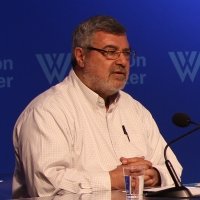The Arab Awakening: Lessons Learned and Challenges Ahead
Two experts assessed the past three years of political and economic flux in the Arab world, providing their insights on what they believe will be the challenges to political development moving forward.
On March 8, the Middle East Program at the Woodrow Wilson Center hosted a meeting, “The Arab Awakening: Lessons Learned and Challenges Ahead” with Rami Khouri, Director of Issam Fares Institute for Public Policy and International Affairs at the American University of Beirut, and Robin Wright, Wilson Center-USIP Distinguished Scholar. Haleh Esfandiari, Director of the Middle East Program at the Wilson Center, moderated the event.
Khouri outlined his central points for understanding the political transitions taking place in the Arab world. First and foremost, he noted that people across the region share a common set of political and material grievances. He also discussed the significance of constitutional development in countries such as Egypt and Tunisia. He argued that people in the Arab world must “agree upon the rules” before they can have successful democratic transitions. Additionally, he stressed the importance of Islamist parties in Arab politics, explaining that actors across the region will have to configure frameworks of governance that incorporate both secular and religious demands.
Khouri ended his analysis on a positive note, arguing that the problems plaguing democratic transition will be resolved in time, and with millions of Arabs operating in the public sphere for the first time, there are prospects for positive change ahead.
Wright continued the discussion by pointing out that there are both cultural and political dimensions to the developments taking place across the region. She noted that there are profound changes taking place in the way people in the region are expressing themselves, whether it is through social media, underground music, or gender movements.
In reflecting upon the political dimensions of change, Wright outlined several key challenges to democratic transition in the region. For one, there is yet to be a definitive political framework to effectively replace the old order. The political parties that have formed are not yet viable, lacking discipline and broad national agendas. In turn, tribal, religious, and sectarian affiliations are emerging as people’s primary sources of identity.
At the same time, most countries in the region are facing dire economic problems, leaving women and youth particularly disaffected. Women, she stressed, have fared poorly in the past three years, as their basic security and rights are coming under constant threat.
Moving forward past these challenges, Wright projected major changes for region, not only in the writing of new democratic constitutions but also in the writing of new political borders and regions that will accommodate the people’s demands.
By Darya Razavi, Middle East Program
Speakers

Distinguished Public Policy Fellow at the American University of Beirut, Arab Center Washington Senior Fellow; Al Jazeera columnist; Author

Hosted By

Middle East Program
The Wilson Center’s Middle East Program serves as a crucial resource for the policymaking community and beyond, providing analyses and research that helps inform US foreign policymaking, stimulates public debate, and expands knowledge about issues in the wider Middle East and North Africa (MENA) region. Read more
